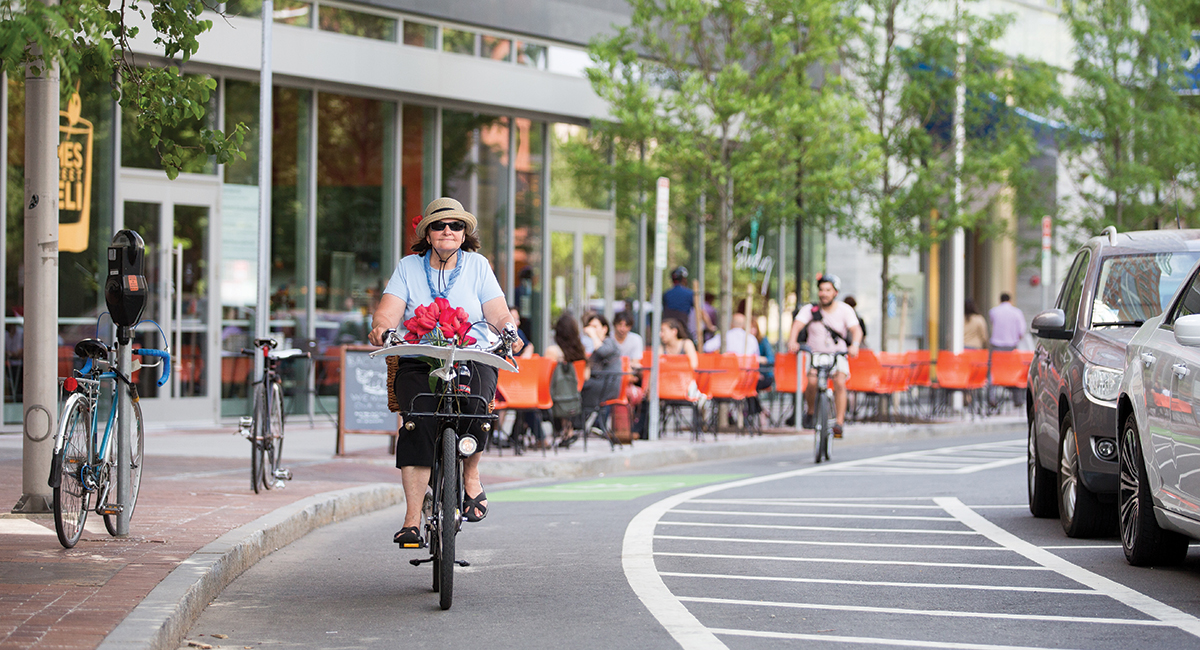Rights of way are public space, yet the way they have historically been planned, designed and managed has excluded certain age groups, economic classes, and people with mobility and vision constraints. Washington State is taking strong steps to change this history of inequitable streetscapes.
The state’s Transportation Improvement Board (TIB) developed an innovative new way to encourage local cities and counties to adopt not just a Complete Streets ordinance, but to develop a Complete Streets ethic in their operations, planning, design and maintenance. The result is that, in less than a year, Washington has more than doubled the number of communities with Complete Streets ordinances, and 39 communities are now using TIB award funding to make their streets safer and more accessible to all users by investing in walking, biking, transit and aesthetic improvements.
With a very limited legislative appropriation of $7 million annually for Complete Streets awards, the results could have been very different. TIB’s typical infrastructure funding model evaluated the strength of an individual project by comparing it with peer funding applications. With such limited funding, Elmer City, population 238, likely would never have adopted an ordinance or tried to compete with a larger Washington city like Spokane, Seattle or Vancouver. There would have been little incentive for cities to adopt Complete Streets ordinances.
TIB recognized that for this award program to be successful, every city and county in Washington—regardless of size, politics or staffing—would need to see a place for themselves within the award’s framework. After all, communities of all sizes have safety and accessibility concerns in their built environment.
The new approach turns the program’s inherent constraints—a limited budget, an entrenched perception of a “Seattle” bias, and enthusiastic partners—into assets for cultivating communities that want to buy into a Complete Streets ordinance and ethic. Here’s how it works:
- Cities/Counties opt-in to the program by adopting a Complete Streets Ordinance, which makes them eligible for a recognition award.
- Next, a designated state agency (e.g., Washington State Department of Transportation or Department of Health) or an enthusiastic non-governmental organization (e.g., FeetFirst, WA Bikes and Futurewise) must nominate the city or county to receive the award. This strategic partnership extends the geographic reach of Complete Streets concepts to every corner of the State, and offers state and NGO partners a seat at the table to help ensure the program’s success.
- TIB staff then evaluate the city’s/county’s commitment to a Complete Streets ethic. Indicators include integration in comprehensive/strategic plans, specific modal plans, ADA transition plans, community engagement, staff training and budgeting priorities for Complete Streets elements.
- The TIB board awards $125,000-$500,000 that can be used on a wide variety of projects that support walking, bicycling, access to transit and streetscape aesthetics. Within those parameters, the the awarded cities and counties have control over how they would like to spend these funds.
The results? In 2016, the first year of the Complete Streets Awards Program, 43 more communities adopted Complete Streets ordinances and are making their streets safer and more accessible. That’s the same number as had done so in the entire decade before! With nearly 26% of all cities and counties adopting an ordinance, Washington leads the continental US by a huge margin, with Wyoming coming in second with just 2.5%.
Before 2016, most of the communities that adopted Complete Streets ordinances were in more urban Western Washington. In 2016, most were from Eastern Washington and 50% were from communities with 5,000 or fewer residents. And most impressive, the awards program is driving an upward cycle of equitable safety improvements as communities seek to out-perform their peers in developing Complete Streets projects and receiving recognition awards. Now Washington cities of all sizes are retrofitting existing rights of way and promoting active, environmentally friendly transportation.
The Washington Complete Streets Awards program won a 2017 Washington APA/Planning Association of Washington award.
Brice Maryman is an award-winning landscape architect working in MIG's Seattle office. He focuses on designing and planning Complete Streets, parks and playgrounds and urban green infrastructure systems. He co-directed the ASLA award-winning Open Space Seattle 2100 project, and is currently one of the Landscape Architecture Foundation’s Innovation and Leadership Fellows, exploring the intersection of homelessness and public space. You can reach him at bmaryman@migcom.com.

